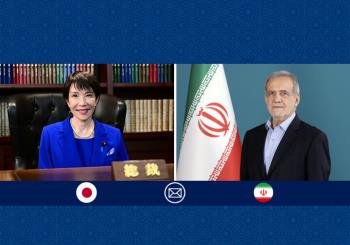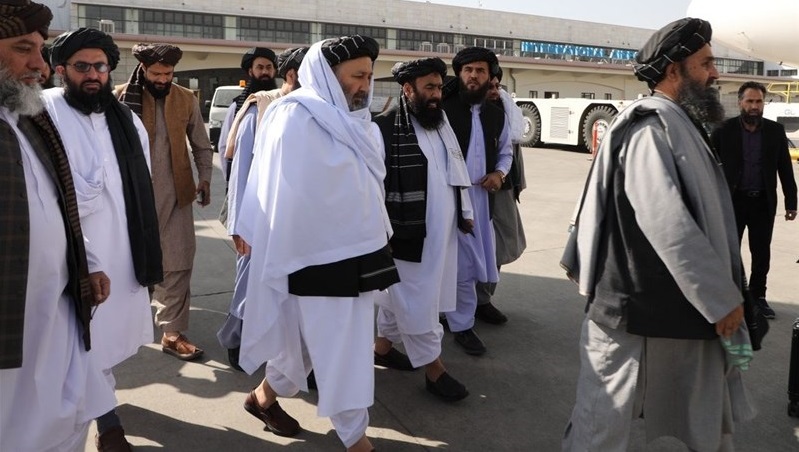Alwaght- The catastrophic Afghanistan conditions and continuation of the American sanctions on this Central Asian country have pushed the Taliban leaders to the conclusion that to beat this situation, they need to expand relations with neighbors. To this end, the Acting Deputy Prime Minister for Economic Affairs Mullah Abdul Ghani Baradar arrived in Tehran heading a high-ranking economic delegation. According to media reports, this large delegation that includes 30 Taliban officials discusses with Iranian officials bilateral ties, trade, transit, transportation, infrastructure, and railways.
Also, regional communications, boosting trade through Iran’s Chabahar port, expanding Afghanistan’s participation in this port and discussing the development of economic cooperation between the two countries are among the other topics discussed in this visit. In addition to Tehran, the economic delegation of the Taliban will travel to some other provinces of Iran and meet with provincial officials and members of chambers of commerce.
Mahmoud Siyadat, the head of Iran-Afghanistan Joint Chamber of Commerce, Industries, and Mines told Fararu news agency that the Afghan delegation will propose a “specific economic package” based on the conditions of the interim government of Afghanistan.
So far, the exact and complete details of the Taliban economic package have not leaked out, but Afghanistan’s Ava news agency, citing some sources, reported that Mullah Baradar will invite the government and the private sector of Iran to invest in the agriculture, mining, transportation, and industry sectors of Afghanistan.
A source in Afghanistan’s Ministry of Foreign Affairs told Ava news that according to the predictions, this visit will focus on economic issues, diplomatic relations, immigrant issues, as well as regional and international matters.
“Abdul Ghani Baradar’s visit shows the good relations between the two countries of Afghanistan and Iran, and important achievements can be made during this visit, which are of great importance from a political and economic point of view. For example, the visit can be effective and useful in terms of helping create a suitable ground for Iranian businessmen to invest in Afghanistan,” the source added.
Meysam Mahdipour, the press aide of Iran’s envoy to Afghanistan affairs, told Islamic Republic News Agency (IRNA) that the Afghan delegation’s visit is meant to upgrade trade and economic cooperation, expand bilateral ties, and explore the ground for further cooperation in trade, transit, investment, customs cooperation, and financial transactions.
In the past two years, Taliban’s political and economic officials have visited Tehran many times and discussed bilateral cooperation in various fields. Although Iran, like other countries, has not yet recognized the government of the Taliban, it has handed over the Afghan embassy to the Taliban’s interim government, and the trade relations of the two neighboring countries are on the track of growth, and according to statistics, Iran’s share of Afghanistan’s market reaches 35 percent. In addition, Iran also sent humanitarian aid to this country during natural disasters in Afghanistan under Taliban to ease part of the country’s economic troubles.
Trade boost, the top agenda
As remarks by officials of the two countries show, trade is on the top of agenda of Tehran and Kabul bilateral relations. Ismail Baqeri, an Iranian expert of Afghanistan affairs, told Alwaght on the agenda of the Taliban delegation that “the purpose of this visit is to expand relations in commercial fields from agriculture and industry to service sector and investment in Afghanistan’s mines. The issue of strengthening railway networks, customs and border markets will also be discussed in this trip. Taliban officials are also supposed to hold meetings with members of the Supreme National Security Council and officials of the Ministry of Foreign Affairs.”
Baqeri also linked the Taliban delegation’s visit to some current regional developments, adding: “The visit of this business delegation takes place at a time when the government of Pakistan last week announced the plan to deport Afghan immigrants and had earlier closed Torkham and Chaman border crossings with Afghanistan, spoiling fruits that were supposed to be exported from Afghanistan to Pakistan. This issue caused the Taliban to review its relations with Islamabad and develop its business relations with Iran.”
According to Baqeri, Iran has provided incentives to the Afghans to use border customs and even Port of Chabahar. The North-South Corridor and China’s Road and Belt Initiative (RBI) initiative are also of influence, and the Taliban think that the safest and most economical route for Afghanistan’s trade is Chabahar. Tehran has offered many facilitations for Afghanistan’s use of its trade routes.
It is noteworthy that in the past year, a lot of progress has been made in the development of the Iran-Afghanistan’s Khaf-Herat railway. This railway is 225-kilometers long and was designed in four sections, the first and second sections of which are inside Iran and the third and fourth sections inside Afghanistan.
Asked about the case of Afghan immigrants and if it is raised in the talks, Baqeri said that immigrants can be discussed by the two sides, but Baradar has no power in this case.
“Concerning those Afghan immigrants who have no identification documents in Iran and are possible to make troubles, Tehran has to return them to their country, but those identified and registered make no problem and can stay in Iran,” Baqeri held.
It seems that the acting government of the Taliban has realized the position of Iran in the business developments of the region and the world and is trying to expand its foreign trade by playing a role in communication corridors, especially railways, and enjoy the benefits of regional transit.
Should Khaf-Herat railway is completed, Afghanistan trains will get access to Iran’s railway network and Afghan products will be sent to the international markets cheaper and more secure using rail transport than trucks. In addition, Afghanistan will be connected to the ports of the Persian Gulf, the Oman Sea, the Caspian Sea and the Indian Ocean, which can lead to economic prosperity in this country. Khaf-Herat railway will not only strengthen Afghanistan’s trade with Iran, but will also help develop Kabul’s trade with other countries in the region.
Trade data suggest that currently 40 percent of Afghanistan’s imports takes place through Dogharun border crossing in Iran’s Taibad town. Therefore, the operation of Khaf-Herat railway will cut by 50 percent the 180,000 trucks that transport goods between Iran and Afghanistan through Dogharun annually. It not only reduces the cost of freight transportation, but also it will substantially increase the trade volume between the two countries.
Afghanistan has always dreamed of gaining access to the high seas, so, with the operation of the North-South Corridor, Afghans will get the opportunity to bolster their trade through Port of Chabahar, since Iran-Afghanistan transit transactions are supplementary to India-Central Asia trade route, and since Afghanistan shares hundreds of kilometers of borders with Iran and among other Eastern neighbors exports the largest amount of goods to it, the North-South Corridor operation will more than ever boost this trade.



























